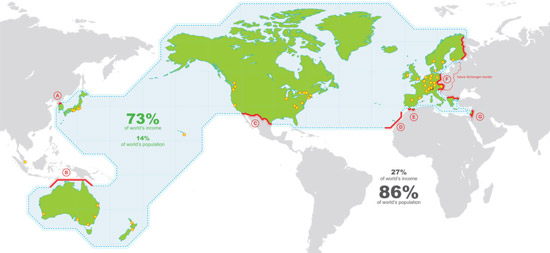Immigration restrictions are similar both in nature and consequences to unjust intra-state restrictions on labor mobility that have been repealed in recent times:
- Apartheid in South Africa (repealed around 1990-1994): These laws placed restrictions on the ability of South African blacks to live and work in various cities. These restrictions impinged on the free association rights of not only blacks but also the whites who may have wished to deal with them as customers, partners, or employees.
- Jim Crow laws in the United States (major repeal with the Civil Rights Act of 1964): These laws placed restrictions on blacks with respect to jobs and also restricted the freedom of private businesses (regardless of ownership) by requiring them to segregate their place of business according to race. See also immigration restrictions as Jim Crow.
Immigration restrictions are similar to apartheid and Jim Crow laws, but their main criterion of discrimination is not race but place of birth/origin. This is not to say that the intentions of immigration restrictionists are racist. Many supporters of apartheid and Jim Crow laws may not have been personally racist either — but were simply defending the status quo as they did not think the system could be dismantled.
See also:
- Open Borders: The Case blog posts on global apartheid and wage discrimination
- The concept of the place premium, which uses variation in wages between statistically identical people working in different countries to estimate the arbitrary wage gap that could be eliminated by open borders
- Ending Global Apartheid by Kerry Howley in Reason Magazine, based on an interview with development economist Lant Pritchett.
- Why America Needs Immigrants by Philippe Legrain on the Global Public Square on CNN.com, June 8, 2012. The piece references the idea of global apartheid as a description for the current global regime of immigration restrictions. The piece was referenced and quoted by Ilya Somin in his blog post Immigration and Discrimination on the Volokh Conspiracy blog.
- Michael Clemens: The Biggest Idea in Development that No One Really Tried:
The map featured at the top of this post was created by Theo Deutinger, and depicts the barriers to human movement that have been erected by the developed world.


13 thoughts on “Global apartheid”
Comments are closed.